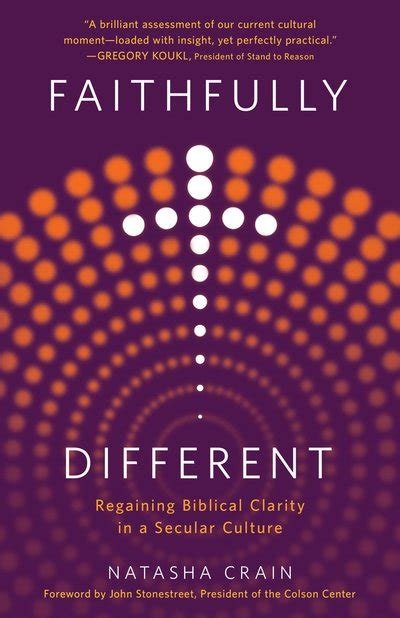Faithfully Different: Why Worldview Matters
You may have seen in the news this week that Whoopi Goldberg was called out for her comments about the Holocaust as “not about race.” The comments were considered “wrong and hurtful.” Historically, the Holocaust has always been viewed as evil and definitely about race (i.e. genocide). This is a curious event given the postmodernist climate. How a person views the world and makes sense of reality has and always comes down to worldview, the lens through which a person reasons what is true. If you were living in Nazi Germany, chances are you would be swept up in the cultural tide and also would view the Jews as a threat to the point of desiring their elimination. In the same vein, we all now agree about the evils of slavery, American slavery specifically.
“How a person views the world and makes sense of reality has and always comes down to worldview, the lens through which a person reasons what is true.”
If asked if you would agree with slavery 200 years ago when the cultural climate condoned it, likely as a person living in 2022 you would say definitively no, slavery is racist and vile and you would be one of the few outliers. Interesting how we always seem to see societal evils for what they are when we are far removed from that cultural moment. It’s a wonder about what cultural moment we are in now, and how history will view our cultural norms of today. As in this week’s example of the malleable definitions of “racism” that have been perpetuated in the last couple of years (i.e. Critical Race Theory), we can see that this is a worldview issue.
For the Christian, how do we keep ourselves from getting caught up in the tsunami of change and avoid the whiplash of moral relativism? Most importantly we must arm ourselves with the Word. The Bible communicates the Truth of God, the purpose of creation, His character, and His redemptive plan for history in Jesus Christ. All is for the glory of God! That has never changed. It is consistent in its value of the Imago Dei for every person, whether we are in the time of Nazi Germany or American slavery. It is no wonder Christians were largely the driving force behind eliminating these great evils.
I have had the privilege to read an early copy of Faithfully Different, the next book by apologist Natasha Crain, released this month. Her tagline sums up pretty well what I endeavor to do in my conversations with people, “Regaining Biblical Clarity in a Secular Culture.” As an apologist of historic Christianity in very not-Christian Hollywood, there is a whole lot of confusion about what anything means – even to the Christian! We are swimming in the fishbowl of secularism, and Crain distills so much of the issue: Christians do not know what the Bible really says. We are fighting upstream against a tide of popular culture that in the end (and I do mean The End, as in Revelation), we know we are never going to change. The Lord is coming back for His bride, and we are only going to see the culture descend further from the Way, the Truth, and the Life until He does (unless you’re post-mil, but that’s a whole other topic we won’t address here!).
“The answers from secularism are not going to bring us to utopia, especially in a postmodern, post-truth, post-Christian world. Our worldview must be the lens of true Christianity, the source of Light in all the darkness.”
What I so appreciate about Crain, coming from a marketing background, is she can make sense of the stats. Long story short, it’s not looking great for the Biblical Christian when it comes down to how many actually believe in some very core tenants of Christian doctrine. One pretty uncomfortable section of her book lists all the different kinds of “Jesuses” people believe in, and boy are there many, including Activist Jesus (who died to free the oppressed), Prosperity Jesus (who wants you to live your best life now), and Judge-Not Jesus (who does not want us to call each other out on our sin). These concepts are in contrast with the Jesus of Scripture, the Word made flesh, the Lord and Savior of us all who died for our sins and was raised again from the dead so that believers might partake in the rest of eternity with God in the new heaven and new earth. This earth is going away, so let us not get caught up in the worldview-of-the-day. Culture changes as the popular worldview perpetuates itself, but the Lord remains the same. The gospel is unchanging: Jesus died to reconcile us with the Father, and one day true justice will be dealt and we will have everlasting joy in the presence of our God. The power of forgiveness and grace can move a person to great acts of love and endure tremendous suffering while the hope the cross provides is before her. The answers from secularism are not going to bring us to utopia, especially in a postmodern, post-truth, post-Christian world. Our worldview must be the lens of true Christianity, the source of Light in all the darkness.
“Crain over and over again points to the Truth of what the Bible says, and urges Christians to lean into the authority of Scripture as the North Star of their faith.“
There is so much to be said about the eisegetical nature of how most people in the modern church interpret what the Bible actually communicates. They lessen the lesson of the gospel, even as they try to add to it. Crain over and over again points to the Truth of what the Bible says, and urges Christians to lean into the authority of Scripture as the North Star of their faith. We will be persecuted, canceled, and socially martyred. Some might even die. There is no prosperity-gospel Jesus. Scripture promises we will face tribulation and trials in this world. This is what the apostles and the early church endured. In a time such as this, we need to remind each other that we are called to be different. It’s called sanctification, to be set apart -- that is, holy -- for the Lord.
Faithfully Different by Natasha Crain comes out February 8, 2022 - order your copy today!





